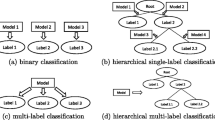Abstract
Multi-label Classification (MC) often deals with hierarchically organized class taxonomies. In contrast to Hierarchical Multi-label Classification (HMC), where the class hierarchy is assumed to be known a priori, we are interested in the opposite case where it is unknown and should be extracted from multi-label data automatically. In this case the predictive performance of a classifier can be assessed by well-known Performance Measures (PMs) used in flat MC such as precision and recall. The fact that these PMs treat all class labels as independent labels, in contrast to hierarchically structured taxonomies, is a problem. As an alternative, special hierarchical PMs can be used that utilize hierarchy knowledge and apply this knowledge to the extracted hierarchy. This type of hierarchical PM has only recently been mentioned in literature. The aim of this study is first to verify whether HMC measures do significantly improve quality assessment in this setting. In addition, we seek to find a proper measure that reflects the potential quality of extracted hierarchies in the best possible way. We empirically compare ten hierarchical and four traditional flat PMs in order to investigate relations between them. The performance measurements obtained for predictions of four multi-label classifiers ML-ARAM, ML-kNN, BoosTexter and SVM on four datasets from the text mining domain are analyzed by means of hierarchical clustering and by calculating pairwise statistical consistency and discriminancy.
Access this chapter
Tax calculation will be finalised at checkout
Purchases are for personal use only
Preview
Unable to display preview. Download preview PDF.
Similar content being viewed by others
References
Benites, F., Brucker, F., Sapozhnikova, E.: Multi-Label Classification by ART-based Neural Networks and Hierarchy Extraction. In: Proc. of the IEEE IJCNN 2010, pp. 2788–2796. IEEE Computer Society, Barcelona (2010)
Brucker, F., Benites, F., Sapozhnikova, E.: Multi-label classification and extracting predicted class hierarchies. Pattern Recognition 44(3), 724–738 (2011)
Cai, L., Hofmann, T.: Exploiting known taxonomies in learning overlapping concepts. In: Proc. of Int. Joint Conf. on Artificial Intelligence (2007)
Cesa-Bianchi, N., Gentile, C., Zaniboni, L.: Hierarchical classification: combining Bayes with SVM. In: Proc. of the 23rd Int. Conf. on Machine learning (2006)
Chang, C.C., Lin, C.J.: LIBSVM: a library for support vector machines (2001), http://www.csie.ntu.edu.tw/~cjlin/libsvm (acc. 03.2010)
Costa, E., Lorena, A., Carvalho, A., Freitas, A.: A review of performance evaluation measures for hierarchical classifiers. In: Proc. of the AAAI 2007 Workshop: Evaluation Methods for Machine Learning II, pp. 1–6 (2007)
Davis, J., Goadrich, M.: The relationship between precision-recall and ROC curves. In: Proc. of the 23rd Int. Conf. on Machine Learning, p. 240. ACM, New York (2006)
Granitzer, M.: Hierarchical text classification using methods from machine learning. Master’s thesis, Graz University of Technology (2003)
Huang, J., Ling, C.: Using AUC and accuracy in evaluating learning algorithms. IEEE Transactions on Knowledge and Data Engineering, 299–310 (2005)
Ipeirotis, P., Gravano, L., Sahami, M.: Probe, Count, and Classify: Categorizing Hidden-Web Databases. In: Proc. of the 2001 ACM SIGMOD Int. Conf. on Management of Data, pp. 67–78 (2001)
Kiritchenko, S.: Hierarchical text categorization and its application to bioinformatics. Ph.D. thesis, University of Ottawa Ottawa, Ont., Canada (2006)
Nowak, S., Lukashevich, H.: Multilabel classification evaluation using ontology information. In: Proc. of the First ESWC Workshop on Inductive Reasoning and Machine Learning on the Semantic Web, Heraklion, Greece (2009)
Silla, C., Freitas, A.: A survey of hierarchical classification across different application domains. Data Mining and Knowledge Discovery, 1–42 (2010)
Struyf, J., Dzeroski, S., Blockeel, H., Clare, A.: Hierarchical multi-classification with predictive clustering trees in functional genomics. In: Bento, C., Cardoso, A., Dias, G. (eds.) EPIA 2005. LNCS (LNAI), vol. 3808, pp. 272–283. Springer, Heidelberg (2005)
Sun, A., Lim, E.: Hierarchical text classification and evaluation. In: Proc. of the 2001 IEEE Int. Conf. on Data Mining, California, USA, vol. 528 (2001)
Tan, P., Steinbach, M., Kumar, V.: Introduction to data mining. Pearson Addison Wesley, Boston (2006)
Verspoor, K., Cohn, J., Mniszewski, S., Joslyn, C.: A categorization approach to automated ontological function annotation. Protein Science 15(6), 1544–1549 (2006)
Wang, K., Zhou, S., He, Y.: Hierarchical classification of real life documents. In: Proc. of the 1st (SIAM) Int. Conf. on Data Mining, pp. 1–16 (2001)
Woolam, C., Khan, L.: Multi-concept document classification using a perceptron-like algorithm. In: WI-IAT 2008: Proc. of the 2008 IEEE/WIC/ACM Int. Conf. on Web Intelligence and Intelligent Agent Technology, pp. 570–574. IEEE Computer Society, Washington, DC, USA (2008)
Wu, F., Zhang, J., Honavar, V.: Learning Classifiers Using Hierarchically Structured Class Taxonomies. In: Zucker, J.-D., Saitta, L. (eds.) SARA 2005. LNCS (LNAI), vol. 3607, pp. 313–320. Springer, Heidelberg (2005)
Yang, Y.: An evaluation of statistical approaches to text categorization. Information Retrieval 1(1), 69–90 (1999)
Author information
Authors and Affiliations
Editor information
Editors and Affiliations
Rights and permissions
Copyright information
© 2011 Springer-Verlag Berlin Heidelberg
About this paper
Cite this paper
Brucker, F., Benites, F., Sapozhnikova, E. (2011). An Empirical Comparison of Flat and Hierarchical Performance Measures for Multi-Label Classification with Hierarchy Extraction. In: König, A., Dengel, A., Hinkelmann, K., Kise, K., Howlett, R.J., Jain, L.C. (eds) Knowledge-Based and Intelligent Information and Engineering Systems. KES 2011. Lecture Notes in Computer Science(), vol 6881. Springer, Berlin, Heidelberg. https://doi.org/10.1007/978-3-642-23851-2_59
Download citation
DOI: https://doi.org/10.1007/978-3-642-23851-2_59
Publisher Name: Springer, Berlin, Heidelberg
Print ISBN: 978-3-642-23850-5
Online ISBN: 978-3-642-23851-2
eBook Packages: Computer ScienceComputer Science (R0)




